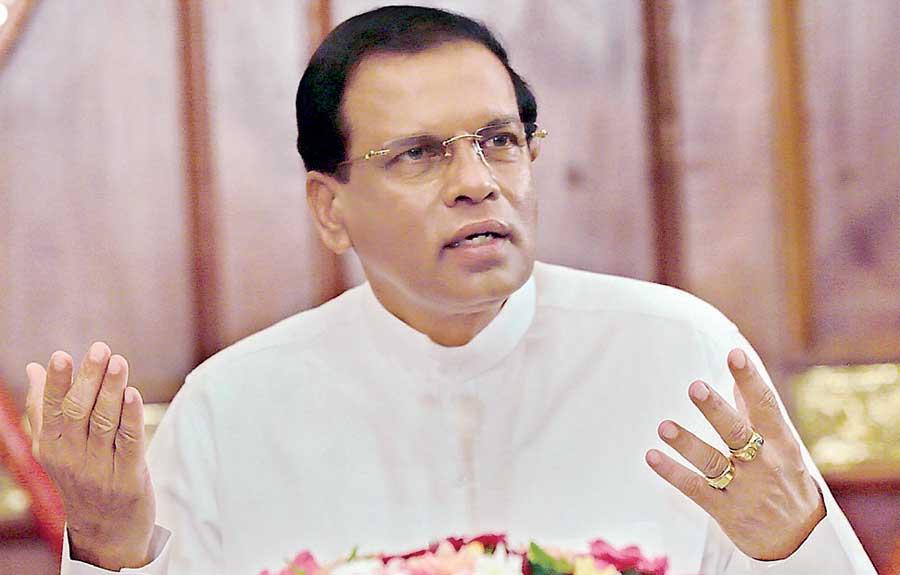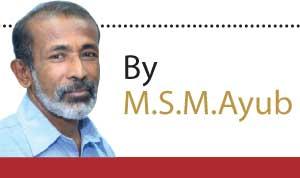Reply To:
Name - Reply Comment

- Frustration and uncertainty clearly visible in President Maithripala Sirisena over his political survival and the safety of his family
- Somersaults and attempts at dangerous political experiments derive from his insecure feeling
- LG Poll results a clear sign of a comeback of the Rajapaksas
- the 19th Amendment ultimately created two almost equal power centres and thereby a chaotic situation
The uncertainty and frustration in President Maithripala Sirisena over his political survival and the safety of his  family have been clearly visible for the past one year. He who once in the wake of his assuming office in 2015 wanted to send the members of Rajapaksa family to jail attempted last year to patch up with them and later even expected to become their candidate at the forthcoming Presidential Election.
family have been clearly visible for the past one year. He who once in the wake of his assuming office in 2015 wanted to send the members of Rajapaksa family to jail attempted last year to patch up with them and later even expected to become their candidate at the forthcoming Presidential Election.
Then he, without the knowledge or the consent of his party, the Sri Lanka Freedom Party (SLFP), told the United National Party (UNP) that he would support the latter if it fielded a winning candidate at the same election.
It was later followed by an announcement by his loyalists that he would contest as the party’s Presidential candidate. Later he wanted a Referendum to seek the public opinion in order to hold Parliamentary Elections prior to the Presidential Election. His latest prediction on the Presidential Election was that it would be a two-pronged fray.
All these somersaults and attempts at dangerous political experiments derived from his insecure feeling after miserably failing to bring the government under his control and thereby failing to obstruct the avenues for the Rajapaksas to make a comeback.
Although he wanted to send at least one or two prominent Rajapaksas behind bars on corruption charges initially, his partner in governance, the UNP did not seem to have such a penchant.
The UNP leadership even before President Sirisena’s executive powers were pruned by the 19th Amendment to the Constitution, had placed law and order and justice portfolios in the hands of two former lawyers of Avant Guard, a company that was alleged to have benefited during the time of former Defence Secretary Gotabaya Rajapaksa.
The 19th Amendment tied the President’s hands and the UNP leadership was able to run the Government at its will.
"The UNP leadership, even before President’s executive powers were pruned, had placed law and order and justice portfolios in the hands of two former lawyers of Avant Garde, a company alleged to have benefited during the time of former Defence Secretary Gotabaya Rajapaksa"
When he felt his tenure fast approaching its Constitutional end the President began to feel more apprehensive and started to question the authorities’ inaction and delays in respect of the cases against the bigwigs of the former regime.
He, once in 2017, pointedly accused the UNP of intentionally stalling these cases and pathetically said that it was he and not the UNP leaders who would have to face the music in case of a comeback by Rajapaksas.
In the meantime, President due to a misapprehension of the situation did not take action against the Rajapaksa loyalists when they, as SLFP members, openly rebelled against his leadership and promoted another political party.
This cost his political future dearly and finally when at the first ever test his government faced at the last Local Government Elections on February 10, last year, he found that he had been isolated with a handful of unreliable people.
The results of those elections sent shockwaves within the ranks of the UNP and the President’s SLFP and compelled President Sirisena to think about his strategies afresh.
The election results were a clear sign of a comeback by the Rajapaksas and the President then adjusted his strategies accordingly.
He successfully sent feelers to the former President and lured him for a constitutional coup in October last year. He sacked Ranil Wickremesinghe from the premier post and replaced him with Mahinda Rajapaksa on October 26. When Rajapaksa failed to muster the majority in Parliament he prorogued the Parliament in order for Rajapaksa to do so.
When it was clear that Rajapaksa cannot survive in a numbers game in Parliament President Sirisena dissolved the Parliament. And he thus became not only a friend of the Joint Opposition and the Sri Lanka Podujana Peramuna, both led by the former President but also expected them to name him as their Presidential candidate.
Rajapaksa or his group was not prepared to give such a grand welcome to him who pulled the carpet under their feet in 2015. Then he told the Cabinet which is comprised of only UNP Ministers that he would support the UNP to field a winning candidate at the forthcoming Presidential election. He might have made this statement in order to blackmail the SLPP to agree with his terms or to strengthen the Sajith factor in the UNP.
The few SLFP MPs who are still with the President since they were not welcomed by the Rajapaksa loyalists when they left the government in April last year got wind of the statement and were said to have been agitated.
They with a view of trapping their leader announced that President Sirisena would be their Presidential candidate which the President did not openly deny or subscribe to.
"All these somersaults and attempts to dangerous political experiments derived from his insecure feeling after miserably failing to bring the government under his control and thereby failing to obstruct the avenues for the Rajapaksas to make a comeback"
Apparently, out of desperation over his political future, President Sirisena in early this month had contemplated holding a referendum to seek public opinion on an early Parliamentary election prior to the Presidential election that has to be held before December 9. The idea vanished into thin air since it did not hold water and there were no takers for it.
His next announcement that the oncoming Presidential election would be two-pronged is not clear. But he will have to be out of the fray for it to materialize. It is a total acknowledgement of the defeat of his all strategies.
He now blames the 19th Amendment to the Constitution for all his ills, despite it being brought in to keep his main election promise. He had toiled to persuade and compel the Rajapaksa loyalists to vote for it and ultimately had boasted to have upheld the democracy in the country through it.
However, while speaking at the 40th anniversary of the National Housing Development Authority at the BMICH on Sunday he said that both the 18th and 19th Amendments - two pieces of legislation he had wholeheartedly supported - have to be rejected.
"The present messy situation vindicates the JVP’s demand for the total scrapping of the Executive Presidency, but it too would not remove the ill effects of a bad Prime Minister who would then wield the executive powers"
While rightly describing the 18th Amendment as monarchical and dictatorial he said that the 19th Amendment brought instability to the country. In fact, the 19th Amendment was introduced to curtail as much powers as possible vested in the President since the Supreme Court had ruled that abolition of Executive Presidency as promised by the then Opposition’s common candidate Maithripala Sirisena needed a Referendum.
Against this backdrop the UNP while re-establishing through the 19th Amendment the Independent Commissions that were abolished by Mahinda Rajapaksa through the 18th Amendment, very craftily built a fortress around the Prime Minister, while tying President’s hands in respect of day-to-day Governance.
Thus the President had to consult the Premier when appointing and sacking ministers and changing their subjects.
He was deprived of the power to unseat the Prime Minister even in case of a clash between him and the latter while he had to forfeit his power to dissolve Parliament in one year after the first meeting of it.
He had to put up with any chaotic situation, as the case has been now, until the expiry of four and a half years out of the Parliament’s five-year term.
Since the essence of the demand for the abolishment of the executive Presidency meant the transferring of executive powers from President to the Cabinet/Prime Minister, these changes were then seen as progressive steps.
Also as these changes were introduced in the wake of a dictatorial Presidential rule, they were then justified in the eyes of the ordinary people.
Since they were coupled with the democratic reforms such as the Independent Commissions and the provisions for the right to information, they too were hailed as part of those reforms.
However, the 19th Amendment ultimately created two almost equal power centres and thereby a chaotic situation.
In a way, President Sirisena who vowed to forego all his executive powers in 2014 is now pathetically grumbling over losing half of his powers.
The present messy situation vindicates the JVP’s demand for the total scrapping of the Executive Presidency, but it too would not remove the ill effects of a bad Prime Minister who would then wield the executive powers.